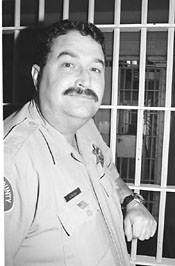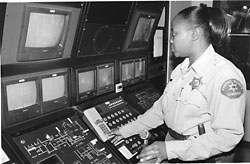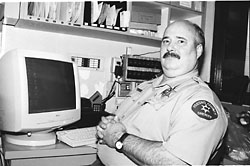Dragon Info
|
Fresno
County Jail Correctional by Ed Herzog
Corrections officers’ primary job is insuring inmates’ health and welfare, making sure they are adequately fed, their medical needs are taken care of, appointments with the court and attorneys are met, and they are housed in a safe environment. Correctional officers are unarmed but carry pepper spray and an expandable baton. Because their job requires they make split-second decisions every day, a well-balanced temperament is a necessity. “We’re not judge and jury,” says McGill. “There may be innocent people in here. Would you want to punish an individual because of what you think about his charge? Our job is to take care of inmates’ health, welfare, and institutional needs, and that’s it. You’re not here because you want to be their friends. You’re not here because you want to be their religious advocate. You must remain neutral, but you’ve got to be firm. You cannot let them manipulate you into breaking the rules.” The county jail houses inmates convicted of misdemeanors or low grade felonies who are sentenced to one year or less and those awaiting trial for offenses ranging from public drunkenness to murder. Low staffing requires officers to work mandatory overtime. “When you work two shifts you’re not on your toes,” adds McGill. “You miss little things that can turn into something serious. Recently an officer was stabbed with a sawed-off ping pong paddle. He had to make his own escape from the assault. Had other officers been more aware, they might have been able to get in and help him faster. Fatigue may have played into that assault You let your guard down for just that one second, you pay for it.” According to McGill, the sheriff has proposed several plans to alleviate the problems of understaffing and excessive overtime. The department floated the idea of hiring community service officers and deputies as a solution to the staffing problem. Community service officers work with children in Fresno’s schools. “These people are going to come in here and work with an inmate? With, according to the sheriff, the most dangerous people in Fresno County? As a correctional officer, would you want an untrained, community service officer watching your back? To help you in an emergency? I don’t think so.” The Sheriff’s Department has proposed mandatory 12-hour shifts to eliminate overtime. “This plan doesn’t eliminate working more hours, just overtime pay,” says McGill. “They come up with all these new ideas, but at the core is lack of respect for the work we do. I love Fresno. My family’s in Fresno. I want to stay here. But when the sheriff comes along and says, ‘Hey, you know what? I don’t want to pay benefits so I won’t hire more people. I’ll try to get more work done with less,’ it’s very disrespecting to those of us who have worked hard for many years. Many officers who recently retired say they’re glad they won’t be here because they can’t handle the load. Does someone have to get hurt, or die, for the sheriff to recognize what’s going on?” Help People
The hardest part of the job for Johnson is the lack of public recognition for the stresses workers confront under the current administration. “As long as inmates are locked up the public doesn’t care. They don’t know how dangerous it is in here, with the stabbings, the fighting, and the understaffing,” explains Johnson. “It’s disturbing, but after working here for a while you get desensitized. You just do your job and keep going.” Johnson is one of the few women who work at the jail. “It’s good to have women assigned here because it gives the inmates an out. You have these big tough guys fighting and they will let a woman separate them because they are less likely to strike a female,” says Johnson. “They can calm down and pull themselves out of the situation by saying, ‘Well, I don’t want to hit her, because she’s a female.’ Whereas if a man responded, and an inmate’s boys are watching him, he’ll feel more compelled to hit an officer. A lot of men will tell you they prefer a female for back up.” Johnson says the county will eliminate 120 jail positions and staff them with community service officers and deputies when the new jail is built. Johnson, like McGill, is opposed to the plan. “Community service officers have no experience working in jails. They go to schools and talk to children, people who are not a threat,” notes Johnson.”I don’t want somebody like that watching my back. This morning, I and another officer responded to an altercation while another officer coordinated the central station by himself. Could we have done that with a community service officer? I don’t think so, and I don’t want to find out. This is what I want to do, and it’s something I’m good at. But I only feel safe because of my co-workers. We need trained, competent staff, not unqualified people. This isn’t school.” A Career
The job can be mentally fatiguing. “You have to be very aware and watchful of your surroundings. You have to be conscious of everything that goes on on the floor,” says Schwartz. “You don’t want to miss anything. You get to be familiar with inmates. When you see a change in behavior, then you know something’s going on. Sometimes you can tell if something is going to happen just by watching the inmates. “This job is rewarding. I started when I was 38. I wanted a job and a career and this is it.” Agency Shop
“Every time you go through contract negotiations you have to fight for everything all over again,” says Gann. “Management has their agenda, like 12-hour shifts, eliminating overtime, and bringing in unqualified classifications. Awhile back, they came up with an idea for a new overtime shift. We were all going to work every Saturday, our day off. They told us it was a done deal, it’s already scheduled, it’s going to happen. Did it happen? No. Why? Because our contract has language that states changes in overtime must be negotiated with the union.” Dependent Health Coverage One benefit correctional officers have wanted for years is dependent health coverage. But, says Gann, it won’t happen unless correctional officers stand together and speak with one voice. “It would be very difficult, if not impossible, for one person to go to the board of supervisors or the legislature and ask for more staffing in the jail,” adds Gann. “They would just laugh at you. But if we as a union unite together and make our demands known, we’ll have more clout. That’s why we need agency shop.” “To make any kind of changes we need political power,” adds McGill. “That’s where agency shop comes in. In 1997 people sold the union short and said they had no political power here in Fresno. Several units went on strike, including the jail. We were able to increase management’s 1.5% wage offer to a 12% salary increase. We never would have gotten that if we weren’t organized. If we went to a closed shop we would have the power to really make a difference.” “When you don’t have agency shop, just a few people fight for everything, but everyone still gets the benefits, even those who don’t pay any dues. That’s not fair,” adds Schwartz. “If we get a pay raise, they get it too, whether they paid their union dues or not. If everyone’s a union member it gives us more power. You have a bigger voice, and more clout.” “Many union members say the union is too political,” adds Gann. “But with a county job you have to be political. I mean, these people are our bosses. They make all the decisions that affect our jobs. They can be voted in and out of office. That’s why the union has to be political. “Some people don’t want to pay union dues. They think we don’t need a union, but they sure do enjoy union benefits, pay raises, seniority, and vacation. The county didn’t give these things to us out of the goodness of their hearts. We have to fight for them. And the only way we can fight is if we stand together.” “It’s real simple. When you have the numbers, you have the power,” says Johnson. “We’re real excited about starting our agency shop campaign.” |
||||


 Twelve-year
veteran correctional officer Kay Johnson likes her job because she gets
to help people. “One young man I worked with was into pencil drawings,”
recalls Johnson. “I told him about a studio in Manchester Center here
in Fresno. When he got out he got a job with them. I was walking through
Manchester Center one day and he called me over and introduced me to his
family. He’s working there and selling his pencil drawings. It’s gratifying
when you are able to help people.”
Twelve-year
veteran correctional officer Kay Johnson likes her job because she gets
to help people. “One young man I worked with was into pencil drawings,”
recalls Johnson. “I told him about a studio in Manchester Center here
in Fresno. When he got out he got a job with them. I was walking through
Manchester Center one day and he called me over and introduced me to his
family. He’s working there and selling his pencil drawings. It’s gratifying
when you are able to help people.” Correctional
officer Kathy Schwartz got her start in the jail when her husband was
disabled. “Every job I’ve had in the past was like customer service where
you had to kiss someone’s backside,” says Schwartz. “It’s kind of nice
to be in control and be able to say, ‘This is the way things are. This
is our policy, and you’ll follow it.’ I like to be the controller for
a change.”
Correctional
officer Kathy Schwartz got her start in the jail when her husband was
disabled. “Every job I’ve had in the past was like customer service where
you had to kiss someone’s backside,” says Schwartz. “It’s kind of nice
to be in control and be able to say, ‘This is the way things are. This
is our policy, and you’ll follow it.’ I like to be the controller for
a change.” Soon
correctional officers will be deciding whether to implement agency shop
in the jail. Correctional officer Harry Gann grew up in a union family
and knows the value of unionization. “If you study the history of unions
in the ‘20s and the ‘30s, you’ll see that unions are what made middle
class America. Before you had unions you had poor people and you had rich
people and nobody in between,” says Gann. “Unions won the 40 hour work
week, paid holidays, medical benefits, and the eight hour day. A lot of
people take those things for granted. They think we got these benefits
out of the goodness of the bosses’ hearts. They don’t understand that
people died and bled for these gains.
Soon
correctional officers will be deciding whether to implement agency shop
in the jail. Correctional officer Harry Gann grew up in a union family
and knows the value of unionization. “If you study the history of unions
in the ‘20s and the ‘30s, you’ll see that unions are what made middle
class America. Before you had unions you had poor people and you had rich
people and nobody in between,” says Gann. “Unions won the 40 hour work
week, paid holidays, medical benefits, and the eight hour day. A lot of
people take those things for granted. They think we got these benefits
out of the goodness of the bosses’ hearts. They don’t understand that
people died and bled for these gains.